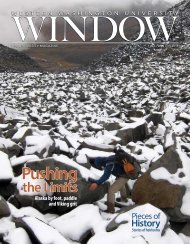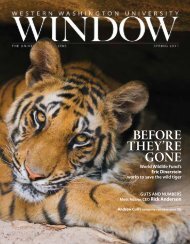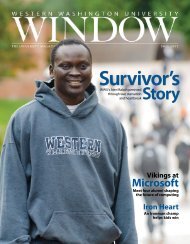WINDOW
Gratitude - WINDOW - The magazine for WWU
Gratitude - WINDOW - The magazine for WWU
- No tags were found...
You also want an ePaper? Increase the reach of your titles
YUMPU automatically turns print PDFs into web optimized ePapers that Google loves.
Continued from page 19.<br />
lobbying for new wilderness and pioneering alternative energy<br />
in his “spare” time.<br />
And his “pay it forward” enthusiasm and strategies are<br />
beginning to influence high school teaching across the country.<br />
After winning a $25,000 national prize in environmental<br />
education, Town, 51, is now an Einstein Fellow at the National<br />
Science Foundation in Washington, D.C., hoping his success<br />
at putting high school students in the front line to fight global<br />
warming will inspire environmental education nationally.<br />
“I want to do in public high schools what Huxley College<br />
did in American universities,” he says. “Huxley was the first,<br />
or one of the first, environmental colleges in the nation that<br />
brought an interdisciplinary, problem-solving approach to<br />
environmental education. I want environmental science as an<br />
interdisciplinary curriculum to become a common core class in<br />
high schools.”<br />
His Cool School Challenge to enlist students, teachers and<br />
school districts to reduce pollution and energy consumption<br />
has gone viral, spreading to about 150 schools across the nation.<br />
At Redmond High School alone, the program has cut at least<br />
$40,000 from energy and waste costs and reduced the school’s<br />
emissions to almost 50 percent below the target reduction set<br />
by the Kyoto Protocols on global warming. Nationwide, the<br />
Cool School Challenge has reduced carbon dioxide and other<br />
greenhouse gas emissions by more than 1.8 million pounds.<br />
teaches middle school science, is a better teacher than he is.<br />
Hey, they met at Western – Meg Town earned her teaching<br />
credential in 1985. WWU can claim credit for both of them.<br />
Town didn’t start off as a model student, more like one of<br />
the middle-of-the-pack kids he recruits into his classes.<br />
His Canadian-born parents were migratory and he spent his<br />
high school years in Orange County, much more interested in<br />
the outdoors than schoolwork. “I never really thought I was<br />
going to go to college,” he recounts.<br />
He went to work as a machinist, but surfing introduced<br />
him to environmentalists trying to save California beaches<br />
and lobbying against the Diablo Canyon nuclear plant. Some<br />
college students he met up with intrigued him with the idea<br />
of studying something he was actually interested in: the<br />
environment.<br />
He hitchhiked across the United States and back, returning<br />
with the notion to try school again at Huxley. “I came to<br />
Bellingham on one of those spectacular, 75-degree blue sky<br />
days,” he recalls. Like legions of students before him, he was<br />
hooked by the campus beauty.<br />
Fate was also at work. When he returned a few months later<br />
to start school, his 1952 panel truck broke its driveshaft in the<br />
Fairhaven College parking lot. Mike Town was at Western to<br />
stay.<br />
“I want to do in<br />
public high schools<br />
what Huxley College<br />
did in American<br />
universities.”<br />
Town lobbied to create<br />
the Wild Sky Wilderness<br />
in the Cascade Mountains,<br />
the state’s first new federal<br />
wilderness area in 24 years.<br />
Town’s teaching shows phenomenal results, too. He<br />
encourages middling high school students to try his rigorous<br />
Advanced Placement Environmental Science course. Not only<br />
do they try, they succeed. Of 143 students in the class last year,<br />
91 percent passed the AP test for certification and college<br />
credit, compared to an average of 49 percent nationally.<br />
To top it off, Town is disarmingly modest: “I’m flattered, but<br />
also embarrassed,” he says. He credits much of his recognition<br />
to being “one of the environmental science teachers doing it<br />
longer than anyone else.” He says his wife of 22 years, Meg, who<br />
20 <strong>WINDOW</strong> • Fall 2010 • Western Washington University<br />
“Huxley students gravitated together,” Town remembers.<br />
“We lived in these cooperative houses and formed a ‘food web’<br />
to buy food together. Everybody got to know each other. We<br />
had potlucks and listened to the same music. They called us ‘The<br />
Granolas’ and we did dress a little differently. But the passion<br />
for and knowledge of science was really strong.”<br />
Inspired by Huxley professors such as John Miles and his<br />
course in environmental ethics, and physical chemist Ruth<br />
Weiner, who stressed the importance of rigorous quantitative<br />
analysis, Town began to have academic success. What<br />
Continued on page 23.<br />
Photos by Josie Liming<br />
www.wwu.edu/window 21








